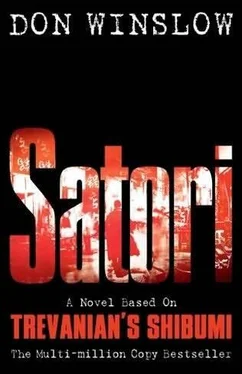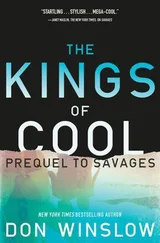Nicholai nodded.
Xue Xin opened his eyes, exhaled a long breath as if to reluctantly end his meditation, and then said, “Sit down. You cannot find enlightenment, you can only be open to it finding you. That’s satori.”
“And why you chose it as a code word,” Nicholai said. “Back in Beijing.”
“You needed to see things as they really were,” Xue Xin answered. “Until then, there was no helping you.”
“If you cannot find satori, how-”
“It might come in a drop of rain,” Xue Xin continued, ignoring the question, “a note from a faraway flute, the fall of a leaf. Of course, you have to be ready for it or it will pass unnoticed. But if you are ready, and your eyes are open, you will see it and suddenly understand everything. Then you will know who you are and what you must do.”
“Satori.”
“Satori,” Xue Xin repeated. Then he added, “If our thoughts imprison us, it stands to reason that they can also set us free.”
Yu came to see him the next morning.
The Chinese had accepted his offer.
THE NORMAL ROUTE of arms shipments from China to Vietnam, Yu explained, was through Lang Son, across the border, and directly into the north of Vietnam, where the Viet Minh had secure sanctuaries in the mountainous jungles.
But they were not going to take that route.
The rocket launchers were needed in the south, not the north.
“That is information that our enemies would pay dearly to obtain,” Yu said.
Indeed it is, Nicholai thought. Since its last disastrous effort in the south, the Viet Minh had confined their activities to the north. But now it appeared that, if armed with the new weaponry, they were planning to launch a new southern front.
The northern Viet Minh were dominated by the Soviets, the southern were more independent or allied with China. A successful southern offensive would shuffle the geopolitical deck in Asia.
Yu was playing a deep game.
Given the fact that the weapons had to go to the southern Viet Minh units, there was only one possible route, down the Lekang River into Laos.
It would be no easy feat, he explained. The Lekang ran through deep gorges with boiling rapids and sharp rocks that could pierce the hulls of boats like eggshells. The river was not easily navigable until south of the town of Luang Prabang, deep into Laos.
Luang Prabang itself would present problems. They would have to switch boats there for the rest of the journey, and the area was rife with spies and French special forces.
And then there was the Binh Xuyen.
“What’s the Binh Xuyen?” Nicholai asked.
“Pirates,” Yu answered.
“Pirates?” Nicholai asked. It seemed a tad anachronistic.
Originally river pirates from the vast Rung Sat marshes south of Saigon, the Binh Xuyen, now opium merchants, virtually controlled that city. Their leader, a former convict named Bay Vien, supported the Viet Minh, but had changed sides and was now a close ally of the puppet emperor Bao Dai and his French masters. As a reward, Bay Vien controlled drugs, gambling, and prostitution in Saigon, and used the resulting vast wealth to acquire modern arms and equipment.
“That’s Saigon,” Nicholai said. “What does Bay Vien have to do with Laos?”
“It’s where the opium comes from,” Yu answered.
The Viet Minh used to buy raw opium in the mountains east of Luang Prabang and sell it to buy weapons, but through bribery, intimidation, and assassinations, the Binh Xuyen had virtually taken control of the Laotian opium trade.
Luang Prabang swarmed with Binh Xuyen. Yu went on, “A Viet Minh agent will meet you there and escort you into Vietnam.”
Nicholai noted the shift to the second-person singular and mentioned it.
“This is why we require your services,” Yu said. “My superiors have decided that they cannot take the risk of my getting captured in French territory.”
He told Nicholai how he would be contacted in Luang Pra-bang and later in Saigon, and then resumed his briefing.
In Laos, the Lekang changed its name to the Mekong as it flowed through Cambodia into the Mekong Delta of Vietnam. The delta would be a challenge – not only would they have to evade the patrols of the French army and the Foreign Legion, but they would have to make their way through a network of blockhouses and forts.
Worse still, the Mekong Delta was patrolled by well-armed militias allied to the French occupiers.
“Where do I deliver the weapons?” Nicholai asked.
“We don’t know.”
“That would make it difficult.”
Yu explained, “In Saigon you will be told where to rendezvous with a Viet Minh agent code-named Ai Quoc, to whom we will deliver the weapons. Quoc is one of the most wanted men in the country, in hiding even now. He’s survived a score of assassination attempts and the French have a huge reward on him. You won’t be told his location until the last possible moment.”
Nicholai mentally reviewed the obstacles – the river, the Binh Xuyen, the French, their Vietnamese militias, and then locating the elusive Ai Quoc.
“So basically,” he said, “this is a suicide mission.”
“It does have that aspect,” Yu answered. “If you want to change your mind, now is the time.”
“I don’t.”
“Very well.”
“We have an arrangement, then?” Nicholai asked.
Yu shook his hand.
Nicholai found Xue Xin at his usual task of trimming vines.
“I came to say goodbye,” Nicholai said.
“Where are you going?”
“I’m not sure,” Nicholai answered, then decided that he owed a better answer. “To find my satori .”
“And if you don’t?”
“Then I will keep my eyes open,” Nicholai answered.
“We will meet again,” Xue Xin said. “In this life or another.”
Nicholai felt an emotion welling up inside him, something he had not felt since the death of General Kishikawa. “I cannot tell you how much you have meant to me.”
“You don’t need to,” Xue Xin said. “I know.”
Nicholai knelt and bowed, touching his forehead to the ground. “Thank you. You are my teacher.”
“And you mine,” Xue Xin said.
Then the monk knelt back down and resumed his work, serene in the knowledge that Nicholai Hel had determined his destiny.
We will meet again, he thought.
YU HAD LEFT the crates of weaponry in the care of a local battalion commander.
Colonel Ki’s belly hung out over his belt, an indication that life was good for a commander in the remote hills of Yunnan. He treated Yu and Nicholai to a very good lunch of fish, vegetables, and mounds of rice, served by an orderly who virtually salivated as he presented each dish.
“I’ll take command of a squad of your soldiers,” Yu said to Colonel Ki, “and we’ll need some of the local Puman as porters.”
“To Lang Son?”
“To the river,” Yu answered. “We will take them from there.”
“Perhaps,” Ki said, “you have misunderstood what ‘Lekang’ really means in Chinese.”
“It means Unruly Waters,” Nicholai answered.
“Unruly to say the least,” Ki commented with the expression of mild sympathy that one gives to an acquaintance who has just embarrassingly revealed that he is terminally ill. But there was money to be made. “For a nominal fee, I can provide boats.”
“I have already arranged for the boats.”
Ki inwardly cursed the rivermen who had sold their services without gaining his permission or giving him his cut, and worried how such a transaction could occur without his knowledge. “An escort, then? You are four days’ march from the river, and despite the party’s heroic efforts, there are still bandits in these mountains.”
Читать дальше












